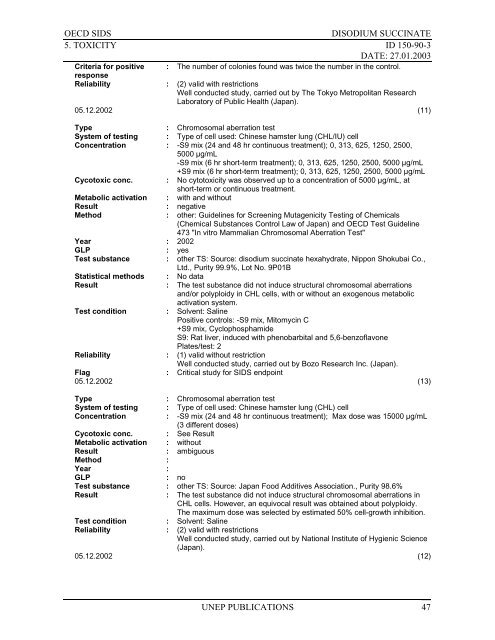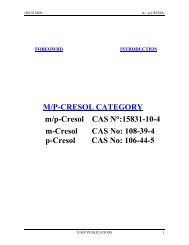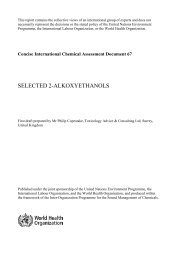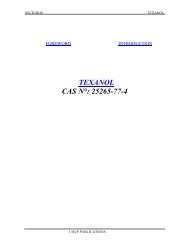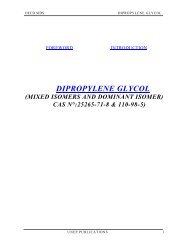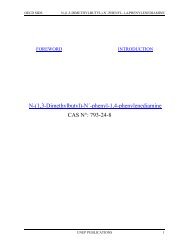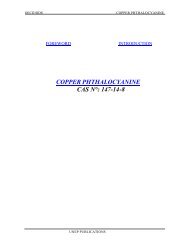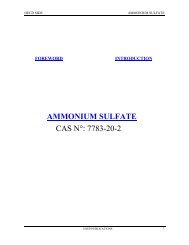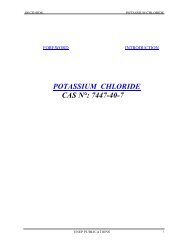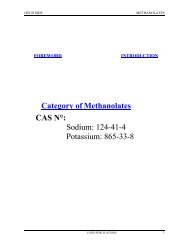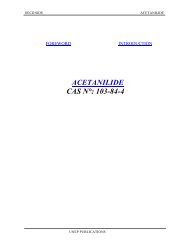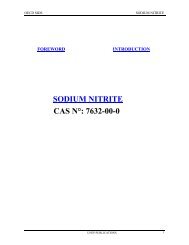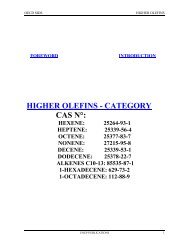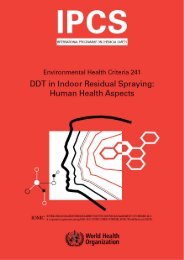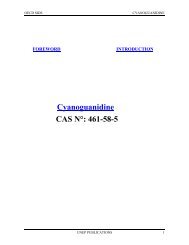DISODIUM SUCCINATE CAS N°: 150-90-3
DISODIUM SUCCINATE CAS N°: 150-90-3
DISODIUM SUCCINATE CAS N°: 150-90-3
Create successful ePaper yourself
Turn your PDF publications into a flip-book with our unique Google optimized e-Paper software.
OECD SIDS<br />
<strong>DISODIUM</strong> <strong>SUCCINATE</strong><br />
5. TOXICITY ID <strong>150</strong>-<strong>90</strong>-3<br />
DATE: 27.01.2003<br />
Criteria for positive : The number of colonies found was twice the number in the control.<br />
response<br />
Reliability : (2) valid with restrictions<br />
Well conducted study, carried out by The Tokyo Metropolitan Research<br />
Laboratory of Public Health (Japan).<br />
05.12.2002 (11)<br />
Type : Chromosomal aberration test<br />
System of testing : Type of cell used: Chinese hamster lung (CHL/IU) cell<br />
Concentration : -S9 mix (24 and 48 hr continuous treatment); 0, 313, 625, 1250, 2500,<br />
5000 µg/mL<br />
-S9 mix (6 hr short-term treatment); 0, 313, 625, 1250, 2500, 5000 µg/mL<br />
+S9 mix (6 hr short-term treatment); 0, 313, 625, 1250, 2500, 5000 µg/mL<br />
Cycotoxic conc. : No cytotoxicity was observed up to a concentration of 5000 µg/mL, at<br />
short-term or continuous treatment.<br />
Metabolic activation : with and without<br />
Result : negative<br />
Method : other: Guidelines for Screening Mutagenicity Testing of Chemicals<br />
(Chemical Substances Control Law of Japan) and OECD Test Guideline<br />
473 "In vitro Mammalian Chromosomal Aberration Test"<br />
Year : 2002<br />
GLP : yes<br />
Test substance : other TS: Source: disodium succinate hexahydrate, Nippon Shokubai Co.,<br />
Ltd., Purity 99.9%, Lot No. 9P01B<br />
Statistical methods : No data<br />
Result : The test substance did not induce structural chromosomal aberrations<br />
and/or polyploidy in CHL cells, with or without an exogenous metabolic<br />
activation system.<br />
Test condition : Solvent: Saline<br />
Positive controls: -S9 mix, Mitomycin C<br />
+S9 mix, Cyclophosphamide<br />
S9: Rat liver, induced with phenobarbital and 5,6-benzoflavone<br />
Plates/test: 2<br />
Reliability : (1) valid without restriction<br />
Well conducted study, carried out by Bozo Research Inc. (Japan).<br />
Flag : Critical study for SIDS endpoint<br />
05.12.2002 (13)<br />
Type : Chromosomal aberration test<br />
System of testing : Type of cell used: Chinese hamster lung (CHL) cell<br />
Concentration : -S9 mix (24 and 48 hr continuous treatment); Max dose was <strong>150</strong>00 µg/mL<br />
(3 different doses)<br />
Cycotoxic conc. : See Result<br />
Metabolic activation : without<br />
Result : ambiguous<br />
Method :<br />
Year :<br />
GLP : no<br />
Test substance : other TS: Source: Japan Food Additives Association., Purity 98.6%<br />
Result : The test substance did not induce structural chromosomal aberrations in<br />
CHL cells. However, an equivocal result was obtained about polyploidy.<br />
The maximum dose was selected by estimated 50% cell-growth inhibition.<br />
Test condition : Solvent: Saline<br />
Reliability : (2) valid with restrictions<br />
Well conducted study, carried out by National Institute of Hygienic Science<br />
(Japan).<br />
05.12.2002 (12)<br />
UNEP PUBLICATIONS 47


